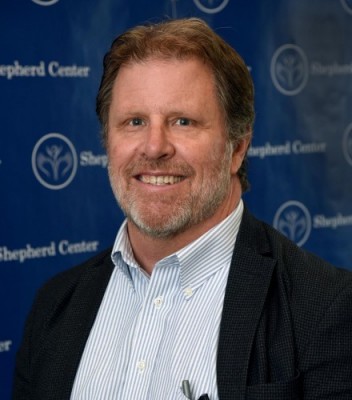Meet George “Brick” Johnstone, Ph.D., ABPP, The O. Wayne Rollins Director of Brain Injury Research at Shepherd Center
Dr. Johnstone joined Shepherd Center in February 2020
 What is your primary role at Shepherd Center?
What is your primary role at Shepherd Center?
I joined Shepherd Center on February 3, 2020, as the O. Wayne Rollins Director of Brain Injury Research. My primary role is to lead research to improve the outcomes of individuals with brain injury.
The priority for me right now in my first several months at Shepherd Center is to organize all of the research for the acquired brain injury (ABI) programs at Shepherd and evaluate and document ways to improve outcomes for patients with brain injury.
What research are you focusing on now?
In general, there are two types of research:
1. Identifying predictors of outcomes. This is where you work with patients and families to determine factors predictive of positive outcomes. This information can then guide the interventions to be developed and tested.
2. Testing the interventions. Once you’ve identified the factors that affect outcomes, you can determine which interventions improve brain injury-related weaknesses and lead to better community functioning for the patient.
Right now, we’re working to prioritize the research projects to develop and test. Shepherd Center is unique among rehabilitation hospitals in the multiple services and programs offered to individuals with brain injuries, including housing for families, transition support services to improve community outcomes and the wealth of services supported by the Shepherd Center Foundation. In addition to the traditional rehabilitation program, Shepherd also offers unique programs such as the Disorders of Consciousness (DOC) Program and the SHARE Military Initiative. I’m interested in assisting staff in demonstrating the effectiveness of all of these Shepherd programs so that other rehabilitation centers can follow our lead. I’d also like to pursue research that demonstrates the effectiveness of more non-traditional rehabilitation therapies, such as recreational therapy and chaplaincy services, for our patients.
Why did you decide to pursue brain injury research?
I have been interested in neuropsychology and understanding different forms of brain diseases for a long time. After I did my internship and fellowship working on rehabilitation teams, I realized that working in rehab is exceedingly rewarding. You get to work with so many disciplines, patients, families, government agencies and community programs. Everyone has the same goal to help people who have sustained brain injuries be as independent as possible. It makes for a very collaborative environment in which to work.
What is the most rewarding part of your job?
What’s nice about being a researcher is that you have to stay up to date on all the innovative interventions, programs and issues that affect individuals with brain injuries. You are always talking to interesting, smart people to learn more. You also get to talk to patients and family members to determine what’s most important to them and then design and test interventions that can help.
What research are you most excited about?
I see a lot of promise in several areas in which Shepherd Center specializes. For example, there are unique opportunities to impact individuals with ABI at all ends of the spectrum. At Shepherd, staff have been looking at creative treatments such as electrical stimulation or music therapy to help individuals with disorders of consciousness that we’re very excited about. We also have outpatient programs where the focus is on making the transition from inpatient programs to community life easier for patients. There is also a lot of potential for research with our special populations like service members in the SHARE Military Initiative, and particularly the various effective treatments to address issues specific to service members and veterans such as blast wave injuries, vestibular problems, sleep issues and PTSD.
EDUCATION AND EXPERIENCE
Experience: Prior to this role, Dr. Johnstone served as senior scientific director of the Defense and Veterans Brain Injury Center in Fort Belvoir, Virginia. He previously held multiple positions at the University of Missouri from 1990 to 2017, including professor and chair of the Department of Health Psychology, as well as director of neuropsychology in the Department of Physical Medicine and Rehabilitation.
Fellowship training: University of Washington
Graduate Degree: University of Georgia
Undergraduate Degree: Duke University
INTERESTING FACTS
- Over the last six years, Dr. Johnstone has participated in research looking at the intersection between neuroscience and humanities. He spent a year in Princeton and two summers in Oxford University collaborating with neuroscientists, social psychologists, philosophers and theologians looking at the intersection between science, religion and healthcare that can inform non-traditional research for people who have sustained brain injuries.
- Dr. Johnstone has a passion for tailoring his ABI research to the needs of the population he is serving. When he worked at the University of Missouri, a majority of patients he treated were from rural areas. He found that people living in rural communities did not have access to rehabilitation professionals once they were outpatients living back at their homes. To help solve this, his team traveled to rural areas to provide services to this rural population. Ultimately, this led to initiating telehealth services and collaborations with the Missouri State Vocational Rehabilitation program to help outpatients who lived in rural communities attain successful employment outcomes. Dr. Johnstone looks forward to tailoring his research to Shepherd Center’s patients as well.
Shepherd Center provides world-class clinical care, research, and family support for people experiencing the most complex conditions, including spinal cord and brain injuries, multi-trauma, traumatic amputations, stroke, multiple sclerosis, and pain. An elite center recognized as both Spinal Cord Injury and Traumatic Brain Injury Model Systems, Shepherd Center is ranked by U.S. News as one of the nation’s top hospitals for rehabilitation. Shepherd Center treats thousands of patients annually with unmatched expertise and unwavering compassion to help them begin again.






